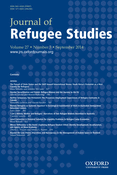-
Views
-
Cite
Cite
Hans Schattle, Jennifer McCann, The Pursuit of State Status and the Shift toward International Norms: South Korea’s Evolution as a Host Country for Refugees, Journal of Refugee Studies, Volume 27, Issue 3, September 2014, Pages 317–337, https://doi.org/10.1093/jrs/fet003
Close - Share Icon Share
Abstract
This article illustrates how South Korea is gradually transforming its policies and practices directed toward a growing population of refugees, humanitarian status holders and asylum seekers. Given many deeply rooted dynamics at the intersection of law and society, South Korea has experienced a difficult trajectory, with a high rejection rate, minimal social welfare provisions and elements of discrimination that have caused alienation and distrust among asylum seekers and refugees regarding their host country. However, rising pressure from civil society has prompted legal and administrative reforms set to place the country on a different path more closely aligned with international human rights norms. The government is also beginning to shift its approach away from an overwhelming emphasis on securitization by working out the challenges of helping the country’s refugees chart their respective courses toward membership and participation.


